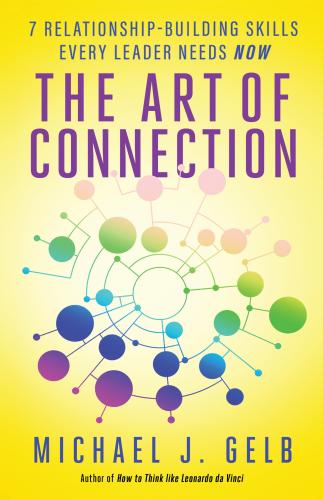Classification: LCC HD57.7 (ebook) | LCC HD57.7 .G4497 2017 (print) | DDC 658.4/092—dc23
LC record available at https://lccn.loc.gov/2017018861
First printing, September 2017
ISBN 978-1-60868-449-6
Ebook ISBN 978-1-60868-450-2
Printed in Canada on 100% postconsumer-waste recycled paper
|
|
New World Library is proud to be a Gold Certified Environmentally Responsible Publisher. Publisher certification awarded by Green Press Initiative. www.greenpressinitiative.org |
10 9 8 7 6 5 4 3 2 1
This book is dedicated to helping you develop the relationship-building skills you will need to lead us to a more creative, enlightened, and compassionate world.
Contents
Introduction: The Secret of Health, Happiness, and Leadership
3. Achieve the Three Liberations
7. Turn Friction into Momentum
Recommended Reading and Resources
“We’re probably the people with the lowest combined GPA and SAT scores who’ve ever sold a company to Warren Buffett!” quipped Gary Spitalnik, EVP of Wheels Up, a membership-based private aviation company. He laughed uproariously as he explained how he and his friends played a role in the sale of Marquis Jet to NetJets, part of Buffett’s Berkshire Hathaway empire. Gary’s warmth and genuine friendliness filled the room when we met at a recent business dinner in Houston. I had just flown in to give a speech and was feeling a bit tired, but his questions and ability to listen to my responses buoyed my energy and inspired my curiosity. As he and his colleagues explained the vision behind their innovative entrepreneurial venture — “democratizing private jet travel” — they also shared how much fun they were having at work. Gary enthused, “Our business is all about connecting with people. We love it!”
When I mentioned that I was writing a book entitled The Art of Connection, he jumped out of his chair and exclaimed, “That’s us! That’s what we are all about. Wait until you meet Kenny.” Spitalnik’s enthusiasm rose to another level as he spoke about Kenny Dichter, the CEO of Wheels Up and cofounder of Marquis Jet and Tequila Avión (featured on the HBO series Entourage and winner of the “Best Tequila in the World” award at the San Francisco World Spirits Competition).
As an article in Entrepreneur magazine states: “Kenny Dichter is someone you want to know, and he wants to know you, too. No, he really does.” Kenny’s wife and business partner, Shoshana, adds that her husband’s success is a “reflection of his gift for connecting with people.” She says, “He’s a master at building relationships.”
The crew at Wheels Up exemplifies many of the skills that we will be exploring. Its leaders transmit a positive energy that is uplifting and contagious. When you interact with any kind of organization, you can usually get a sense of the skill of the leaders based on the energy. When the energy is low and weak, chances are the leadership is poor. When the energy is positive and strong, odds are so is the leadership. This manifests in all kinds of ways, from the largest gestures down to the smallest details. The greeting by the host at a restaurant, the reception at the hotel check-in, and the interaction with a gate agent at an airline all convey powerful messages, for better or worse, about the quality of leadership.
In the course of more than three decades of consulting with organizations around the world, I’ve seen the best and the worst of workplaces. All of the best places are characterized by a sense of camaraderie and connection. This isn’t the only factor in a successful endeavor, but it is a critical one.
My career has been built on developing energizing, enduring connections with visionary, positive leaders. When I began leading seminars for executives, I was the youngest person in the room, and now I’m usually the oldest. My passion for helping emerging leaders learn the skills they need is greater than ever.
What are those skills, and how have they changed? Many of the essentials skills remain unchanged, but others have evolved considerably due to rapidly changing circumstances. The most important shifts include new currencies, free agency, and a more horizontal structure in which diversity, collaboration, and intrinsic incentives play larger roles.
Attention and personal energy are the new currencies. Ten years ago the companies with the largest market capitalization were mostly oil companies, and today they are organizations focused on capturing and selling attention via advertising (Google, Facebook, etc.). The ability to connect with others, to engage their attention, is more important now than ever before. And energy management has replaced time management. When I began my career, “time-management seminars” were ubiquitous. Now these programs are mostly extinct. Professor James Clawson, author of Level Three Leadership: Getting Below the Surface, heralded this shift when he wrote in 1999: “Leadership is about managing energy, first in yourself and then in others.”
We are all free agents. On October 22, 2003, my seminar for regional managers at a multinational pharmaceutical company was interrupted by a special address from the CEO. We were summoned to the cafeteria, where we watched a webcast in which he announced that 4,400 people would lose their jobs in what turned out to be the first of a series of major restructurings. After the shocking news, I asked the group if they wanted to continue with the program or return to their offices. They voted to continue. As one manager stated, “What we are learning is exactly what we need to deal with these challenging circumstances.”
Many large companies like AT&T, Boeing, DuPont, IBM, and Merck, which used to be
